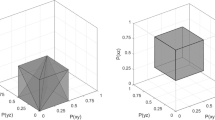Abstract
We explore the relation between two ‘rationality conditions’ for stochastic choice behavior: regularity and the weak axiom of stochastic revealed preference (WASRP). We show that WASRP implies regularity, but the converse is not true. We identify a restriction on the domain of the stochastic choice function, which suffices for regularity to imply WASRP. When the universal set of alternatives is finite, this restriction is also necessary for regularity to imply WASRP. Furthermore, we identify necessary and sufficient domain restrictions for regularity to imply WASRP, when the universal set of alternatives is finite and stochastic choice functions are all degenerate. Results in the traditional, deterministic, framework regarding the relation between Chernoff’s condition and the weak axiom of revealed preference follow as special cases. Thus, general conditions are established, under which regularity can substitute for WASRP as the axiomatic foundation for a theory of choice behavior.
Similar content being viewed by others
References
Bandyopadhyay T., Dasgupta I., Pattanaik P.K. (1999). Stochastic revealed preference and the theory of demand. J Econ Theor 84, 95–110
Bandyopadhyay T., Dasgupta I., Pattanaik P.K. (2002). Demand aggregation and the weak axiom of stochastic revealed preference. J Econ Theor 107, 483–489
Bandyopadhyay T., Dasgupta I., Pattanaik P.K. (2004) A general revealed preference theorem for stochastic demand behaviour. Econ Theor 23, 589–599
Barbera S., Pattanaik P.K. (1986) Falmagne and the rationalizability of stochastic choices in terms of random orderings. Econometrica 54, 707–715
Block H.D., Marschak J. (1960) Random orderings and stochastic theories of response. In: Olkin I., Ghurye S., Hoeffding W., Madow W., Mann H (eds) Contributions to probability and statistics. Stanford University Press, Stanford
Chernoff H. (1954) Rational selection of decision functions. Econometrica 22, 422–443
Cohen M.A. (1980) Random utility systems: the infinite case. J Math Psychol 22, 1–23
Corbin R., Marley A.A.J. (1974) Random utility models with equality: an apparent, but not actual, generalization of random utility models. J Math Psychol 11, 274–293
Falmagne J.C. (1978) A representation theorem for finite random scale systems. J Math Psychol 18, 52–72
Fishburn P. (1973) Binary choice probabilities: on the varieties of stochastic transitivity. J Math Psychol 10, 327–352
Fishburn P. (1977) Models of individual preference and choice. Synthese 36, 287–314
Fishburn P. (1978) Choice probabilities and choice functions. J Math Psychol 18, 205–219
Halldin C. (1974) The choice axiom, revealed preference and the theory of demand. Theor Decision 5, 139–160
Houthakker H.S. (1950) Revealed preference and the utility function. Economica (N.S.) 17, 159–174
Kreps D.M. (1988) Notes on the theory of choice. Westview Press, Boulder
Luce R.D. (1958) A probabilistic theory of utility. Econometrica 26, 193–224
Luce R.D. (1959) Individual choice behaviour. Wiley, New York
Luce R.D. (1977) The choice axiom after twenty years. J Math Psychol 15, 215–233
Luce R.D., Suppes P. (1965) Preference, utility and subjective probability. In: Luce R.D., Bush R.R., Galanter E. (eds.) Handbook of mathematical psychology, Vol III. Wiley, New York
Manski C.F. (1977) The structure of random utility models. In: Eberlein G.L., Kroeber-Riel W., Leinfellner W., Schick F. (eds.) Theory and decision. Reidel, Dordrecht
Marschak, J. (1960) Binary choice constraints and random utility indicators. In Arrow, K.J., Karlin, S., Suppes, P. (eds.) Proceedings of a symposium on mathematical methods in the social sciences. Stanford University Press, Stanford
McFadden D. (2005) Revealed stochastic preference: a synthesis. Econ Theor 26, 245–264
Pattanaik P.K., Peleg B. (1986) Distribution of power under stochastic social choice rules. Econometrica 54, 909–921
Quandt R. (1956) A probabilistic theory of consumer behavior. Q J Econ 70, 507–536
Samuelson P.A. (1948) Consumption theory in terms of revealed preference. Economica 15, 243–253
Sattath S., Tversky A. (1976) Unite and conquer: a multiplicative inequality for choice probability. Econometrica 44, 79–89
Sen A.K. (1969) Quasi-transitivity, rational choice and collective decisions. Rev Econ Stud 36, 381–393
Yellott J.I., Jr. (1977) The relationship between Luce’s choice axiom, Thurstone’s theory of comparative judgment, and the double exponential distribution. J Math Psychol 15, 109–144
Author information
Authors and Affiliations
Corresponding author
Rights and permissions
About this article
Cite this article
Dasgupta, I., Pattanaik, P.K. ‘Regular’ choice and the weak axiom of stochastic revealed preference. Economic Theory 31, 35–50 (2007). https://doi.org/10.1007/s00199-005-0074-2
Received:
Accepted:
Published:
Issue Date:
DOI: https://doi.org/10.1007/s00199-005-0074-2
Keywords
- Stochastic choice
- Regularity
- Chernoff’s condition
- Weak axiom of revealed preference
- Weak axiom of stochastic revealed preference
- Complete domain
- Incomplete domain



